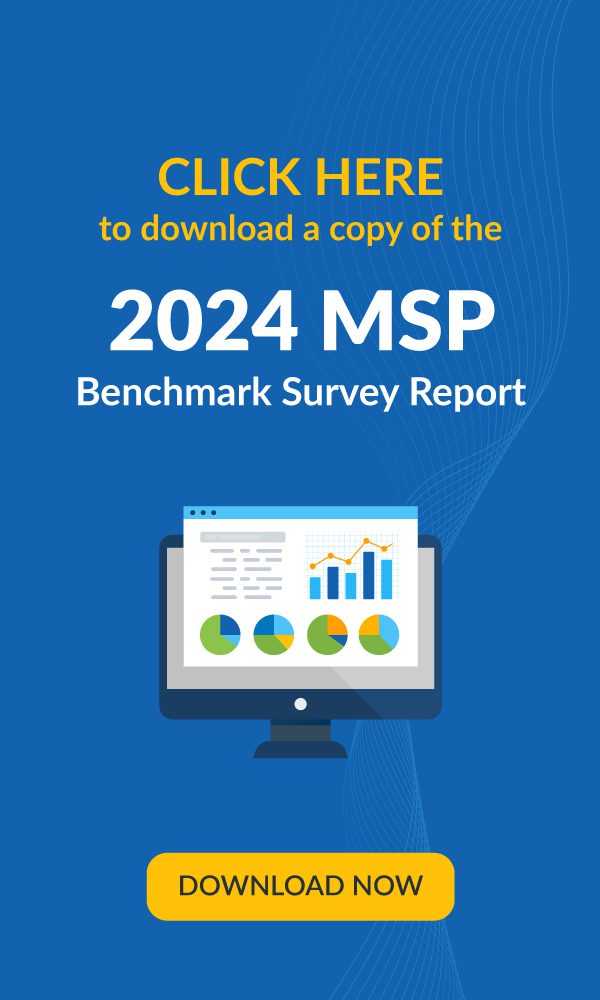Kaseya, continuing its strategic acquisitions streak, in early October announced the acquisition of Spanning Cloud Apps, a leader in backing up SaaS applications, most prominently Microsoft Office 365. In fact, Spanning solutions already back up more than 110 billion items!
The Spanning solutions set is now part of Kaseya’s IT Complete platform, an especially important addition, as the use of SaaS applications is growing rapidly in organizations of all sizes, as our 2018 MSP Benchmark Survey indicates.
Now Kaseya MSPs can immediately expand their data protection capabilities, differentiate their cloud services, and generate extra revenue and high margins from their existing Office 365 business.
There is also ample opportunity for internal IT organizations, many of which are moving to Office 365 and other cloud productivity applications. With Kaseya support, Spanning will maintain its laser focus on providing scalable, powerful cloud-based data protection solutions for SMB and enterprise customers.
Kaseya and Spanning had a partnership prior to the acquisition, which resulted in “Kaseya Office 365 (O365) Backup –powered by Spanning,” a new product fully integrated with the Kaseya IT Complete platform and VSA by Kaseya. Learn more about Office 365 backup here.
Kaseya O365 Backup is now part of the Kaseya Unified Backup (KUB) Suite; providing a single, unified solution for all customer’s entire backup needs, managed from a common interface. With the help of Spanning, the Kaseya unified backup offering covers all MSP and IT user backup use-cases: cloud to cloud, direct to cloud, and a cloud/appliance combination.
The Office 365 Backup Dilemma
Office 365 sounds like it has no real backup issues. After all, all the data is in the cloud — what could go wrong? A lot.
Unless you take extra measures, with Office 365 there is often only one core copy of the data in the cloud – just one tier of storage with no easily accessible additional backup. Much can happen to that one data set. Users could accidently delete information they or others need, and hackers could erase or corrupt larger amounts of data.
Meanwhile, when employees leave, they often delete their data – but that data is not necessarily theirs – it belongs to the organization and should be retained. There are two more reasons to back up SaaS data, a report “Back Up Your SaaS Data — Because Most SaaS Providers Don’t” from Forrester Research asserts. Without backup, there is no recourse when these ills occur:
Prolonged outages. An unexpected and prolonged outage at your SaaS provider can be the remote incident that cripples your business. Unless you have a plan for how to handle such circumstances, it is highly unlikely that you will have access to your data.
Insurance brokerage firms in the UK using services from SSP Worldwide were rendered helpless when SSP faced a three-weeklong outage. Seven different brokers could not issue new policies, look up the expiration dates of existing policies, or communicate with clients. SSP Worldwide could not recover some clients’ data from backup instances — and to brokers’ utter dismay, SSP Worldwide assumed no responsibility for losses they suffered due to the outage.
Data retention policy for audit or compliance purpose. While your organization’s policy or regulatory compliance mandates require you to retain data for few months or years, your SaaS providers will not preserve data for that long.
Organizations must have a plan, and a solution to protect their SaaS, including Office 365, data. “Software-as-a-service (SaaS) is a popular element of a sound technology strategy. While almost all SaaS vendors explicitly state that protecting data is the customer’s responsibility, infrastructure and operations (I&O) leaders usually send critical data to those providers without any plan for ensuring data resiliency. Back up SaaS data or risk losing customers, partners, and employees,” the Forrester report says.
More telling, SaaS providers do not even know if you have lost data. And even if the provider can get your data back, the process is expensive and can take weeks.
As SMBs have migrated from on-premises Microsoft Exchange servers to Office 365, MSPs are rapidly adapting their service offerings. Today, 87 percent of Kaseya MSP customers provide Office 365 services representing over 9 million deployed seats. Our recent Kaseya 2018 MSP Benchmark Survey also found that 49 recent of MSPs have expanded their Office 365 service offering to include backup. The need for full-service Office 365 support and backup is reaching a critical point for MSPs, which is why Kaseya and Spanning came together to develop Kaseya Office 365 Backup.
The Office 365 MSP Opportunity
With Kaseya Office 365 Backup, MSPs will be able to take advantage of recurring revenue opportunities and significant margin potential within their Office 365 customer portfolios. As the fastest-growing SaaS business product in history, Office 365 offers massive opportunity for IT service providers.
One Kaseya MSP understands the opportunity. “As one of the top IT service providers in the US for the past 25 years, the transformation of businesses to Office 365 has been unprecedented,” said Chuck Bubeck, CEO of Ease Technologies. “The ability to backup and restore Office 365 data is critical and the combination of Kaseya and Spanning provides us with the ability to differentiate our offerings to meet this rapidly growing business need.”
Get a demo of Kaseya Unified Backup (KUB) here. You also get a demo of Kaseya Office 365 Backup here.





